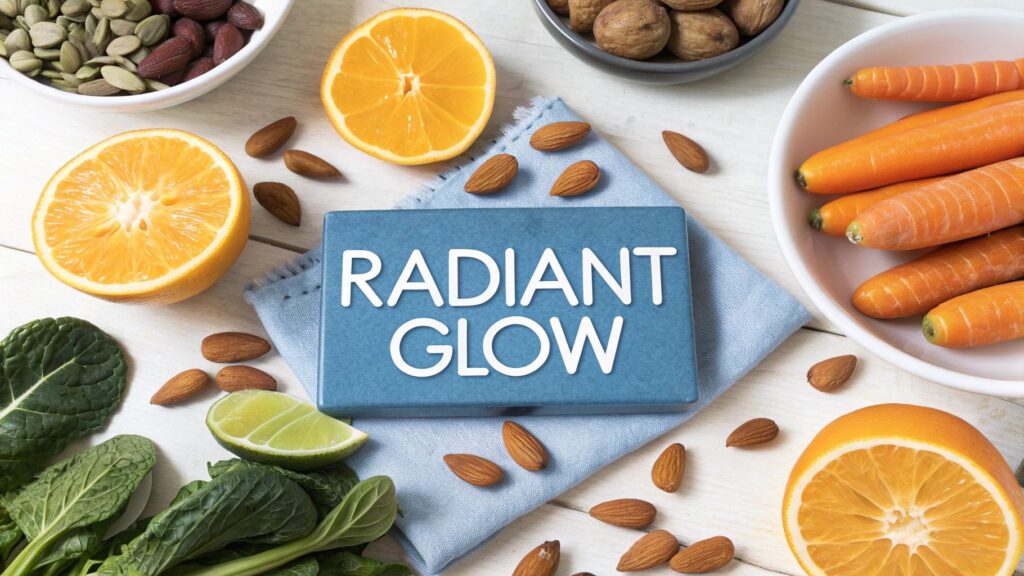When it comes to skin health, the most powerful players work together as a team: vitamins C, E, A, D, and the B-complex family. Think of them as a specialized crew working from the inside out—they repair daily damage, build resilient structures like collagen, and shield your skin from environmental attacks.
Your Guide to a Glowing Complexion
Achieving radiant, healthy skin isn't about finding a single miracle product. It's about building a strong foundation from within. While topical creams and serums have their place, true skin vitality starts with the nutrients you feed your body. These essential vitamins are the literal building blocks and protectors for your skin cells.
This guide goes beyond surface-level advice to show you why nourishing your body is the real secret to a lasting, healthy glow. We'll explore how each vitamin plays a unique and vital role, from fighting fine lines and calming inflammation to reinforcing your skin's natural barrier.
To give you a quick overview, here are the most important vitamins we’ll be covering.
Top 5 Vitamins for Radiant Skin at a Glance
This table provides a snapshot of the most crucial vitamins for skin health, highlighting their key functions and where you can find them in your diet.
| Vitamin | Primary Skin Benefit | Best Food Sources |
|---|---|---|
| Vitamin C | Essential for collagen production, antioxidant protection. | Citrus fruits, bell peppers, strawberries, broccoli. |
| Vitamin E | Protects cell membranes from oxidative damage. | Nuts, seeds, spinach, avocados. |
| Vitamin A | Regulates cell turnover and supports skin repair. | Sweet potatoes, carrots, leafy greens, eggs. |
| Vitamin D | Modulates immune function and skin cell growth. | Fatty fish (salmon, mackerel), fortified milk, sunlight. |
| B-Complex | Supports overall cell metabolism and barrier function. | Whole grains, meat, eggs, legumes, leafy greens. |
Each of these vitamins contributes something different, but they all work toward the same goal: building and maintaining resilient, vibrant skin.
The Core Functions of Skin Vitamins
To really get a handle on their importance, it helps to group these vitamins into three primary jobs: building, protecting, and repairing. Each of these functions is critical for maintaining skin structure, resilience, and appearance, making sure your complexion stays smooth and vibrant.
This infographic breaks down how these key vitamins contribute to the essential functions of skin health.
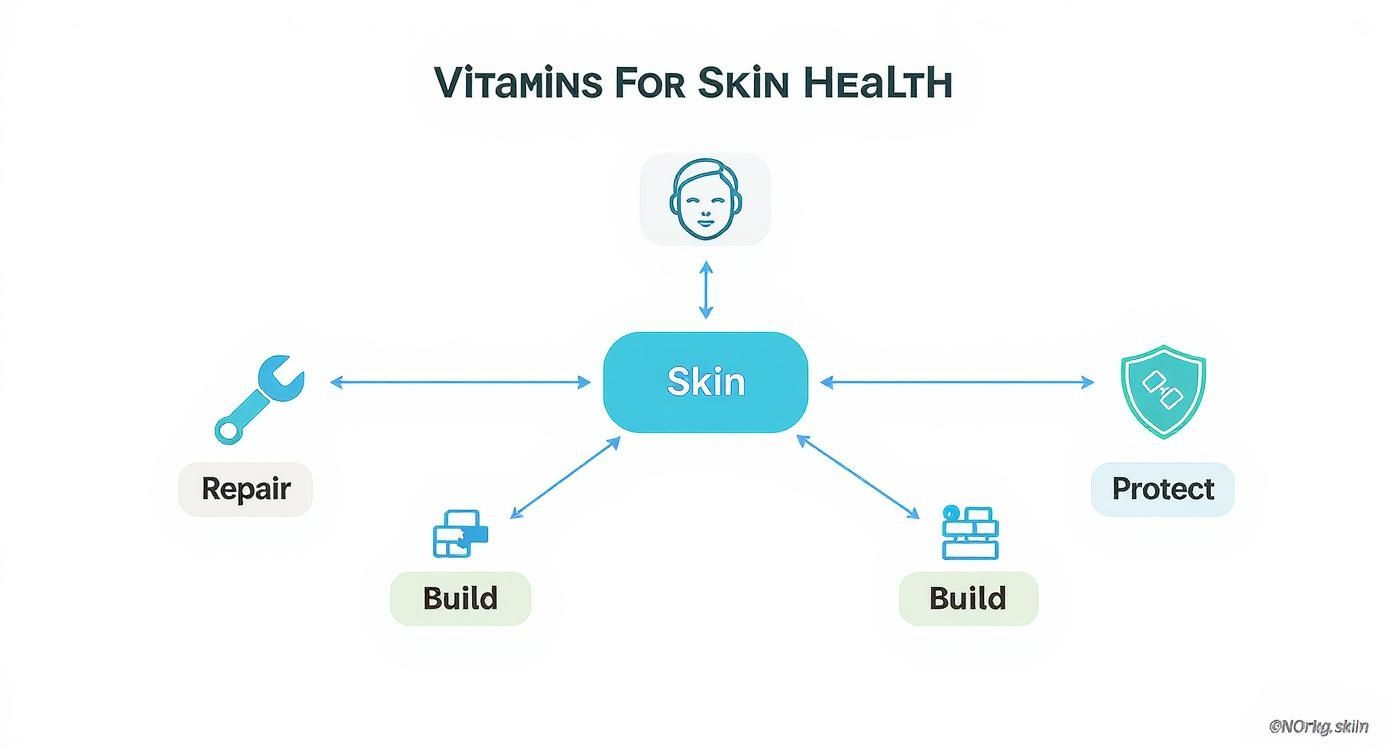
As you can see, these roles are all connected. A vitamin that protects the skin often helps repair it, creating a powerful system of support.
Building Your Skin’s Foundation
At its core, healthy skin needs a strong framework. This is where certain vitamins truly shine, acting like master architects and construction workers for your complexion. They are responsible for creating the proteins that give skin its firmness and elasticity.
- Collagen Synthesis: This is the most critical "building" job. Vitamins like C are absolutely essential for producing collagen, the protein that keeps skin plump and prevents sagging. To get a deeper understanding of this process, you can explore our detailed guide on how to boost collagen production naturally.
- Cell Turnover: Nutrients like Vitamin A regulate the cycle of new cell growth, ensuring that fresh, healthy cells constantly replace old, damaged ones. This process is key to maintaining a smooth texture and even skin tone.
Your skin is constantly rebuilding itself. Providing it with the right vitamins is like giving a construction crew high-quality materials—the final result will be stronger, more resilient, and built to last against daily wear and tear.
By understanding these foundational roles, you can start to see why a nutrient-rich diet is non-negotiable for anyone seeking genuinely healthy skin.
Vitamin C: The Ultimate Skin Protector and Brightener
When you talk about the best vitamins for skin, Vitamin C almost always steals the spotlight—and for good reason. Think of it as your skin’s most loyal bodyguard, working around the clock to protect, rebuild, and brighten your complexion from the inside out. Its main job? A powerful antioxidant, defending your skin at the cellular level.
Every single day, your skin is under assault from environmental stressors like UV radiation and pollution. This exposure creates unstable molecules called free radicals, which act like tiny thieves, stealing electrons from your healthy skin cells. This damaging process, known as oxidative stress, is a direct cause of premature aging, including fine lines, wrinkles, and a dull, uneven skin tone.
This is where Vitamin C steps in. It heroically neutralizes these threats by donating an electron to the free radicals, stabilizing them before they can wreak havoc. This protective act is absolutely fundamental to keeping your skin’s structure youthful and vibrant.
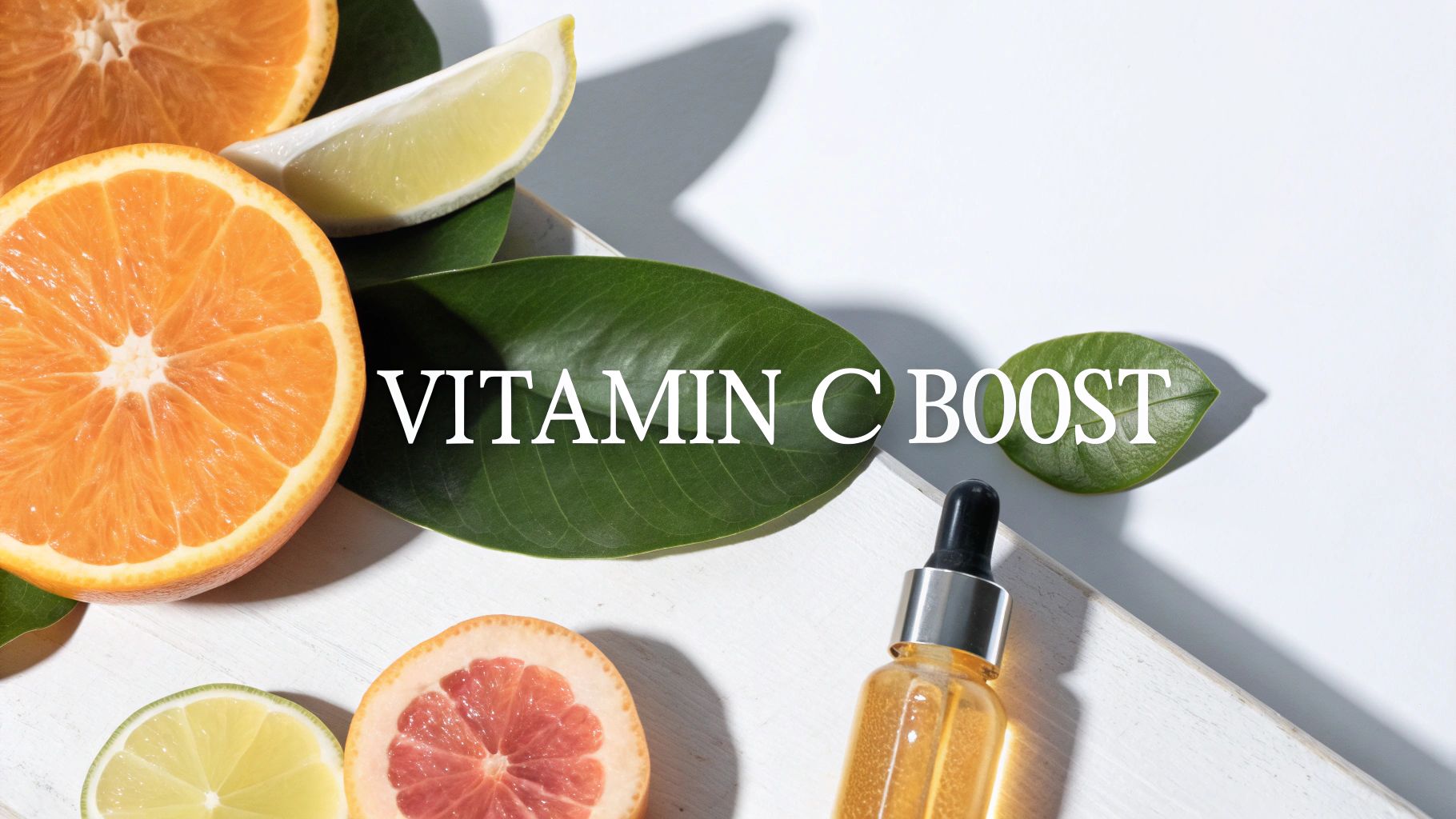
The Master Builder of Collagen
But Vitamin C isn't just a protector; it’s an indispensable partner in building collagen. Collagen is the most abundant protein in your body, and it provides the structural framework that keeps your skin firm, plump, and bouncy. Without enough Vitamin C, this entire production line grinds to a halt.
Imagine trying to build a brick wall without any mortar. You can have all the bricks (amino acids) in the world, but they won't hold together to form a strong wall. Vitamin C is that essential mortar, linking amino acids together to form strong, stable collagen fibers.
A drop in collagen is one of the main reasons skin starts to sag and wrinkle. By making sure your body has plenty of Vitamin C, you are directly supporting your skin’s structural integrity, promoting a smoother, firmer look.
The Power of Synergy with Vitamin E
Vitamin C doesn’t work alone; it's a team player. One of its most important partnerships is with Vitamin E, another antioxidant powerhouse for skin. When Vitamin E neutralizes a free radical, it becomes "oxidized," essentially putting it out of commission.
Here’s where Vitamin C performs a bit of magic. It swoops in to regenerate that oxidized Vitamin E, restoring its antioxidant power so it can get back to protecting your skin's cell membranes. This synergistic relationship means that when both vitamins are present, their combined protective power is far greater than the sum of their parts.
By regenerating Vitamin E, Vitamin C essentially recharges your skin’s entire antioxidant defense system, creating a more robust shield against daily environmental damage.
Achieving a Brighter, More Even Complexion
Ever notice dark spots or an uneven tone after sun exposure or a breakout? That’s usually caused by an overproduction of melanin, the pigment that gives our skin its color. Vitamin C helps get this process under control.
It works by inhibiting an enzyme called tyrosinase, which is critical for making melanin. By slowing this enzyme down, Vitamin C helps prevent excess pigment from forming, leading to some key benefits:
- Fading Dark Spots: It can visibly lighten sun spots and those pesky post-acne marks.
- Brightening Overall Tone: It helps create a more luminous and even-toned complexion.
- Restoring Radiance: It fights back against the dullness caused by environmental damage.
And this isn't just talk—the research backs it up. One study looked at individuals aged 40 to 65 with visible signs of aging. After taking a daily antioxidant blend with 50 mg of vitamin C for 90 days, they saw significant improvements. Participants had better skin moisture, more elasticity, and fewer brown spots, proving its direct impact. You can read more about the study on skin hydration and antioxidant activity.
Vitamin E: The Soothing Hydrator and UV Shield
If Vitamin C is the front-line defender, think of Vitamin E as the steadfast guardian of your skin’s moisture barrier. It’s the ultimate soothing, hydrating, and protective nutrient, working quietly behind the scenes to maintain balance and keep your skin resilient. It's like the sealant for your skin cells, locking in moisture and keeping irritants out.
Because Vitamin E is fat-soluble, it slips right into the lipid layers of your skin. Imagine your skin barrier is a brick wall—the skin cells are the bricks, and the lipids (fats) are the mortar holding everything together. Vitamin E becomes part of that mortar, reinforcing it to stop moisture from escaping and blocking environmental aggressors from sneaking in.
This unique ability makes it one of the best vitamins for skin health, especially if you're dealing with dryness, irritation, or sensitivity. It helps you hold onto that plump, hydrated feel that is the hallmark of healthy skin.
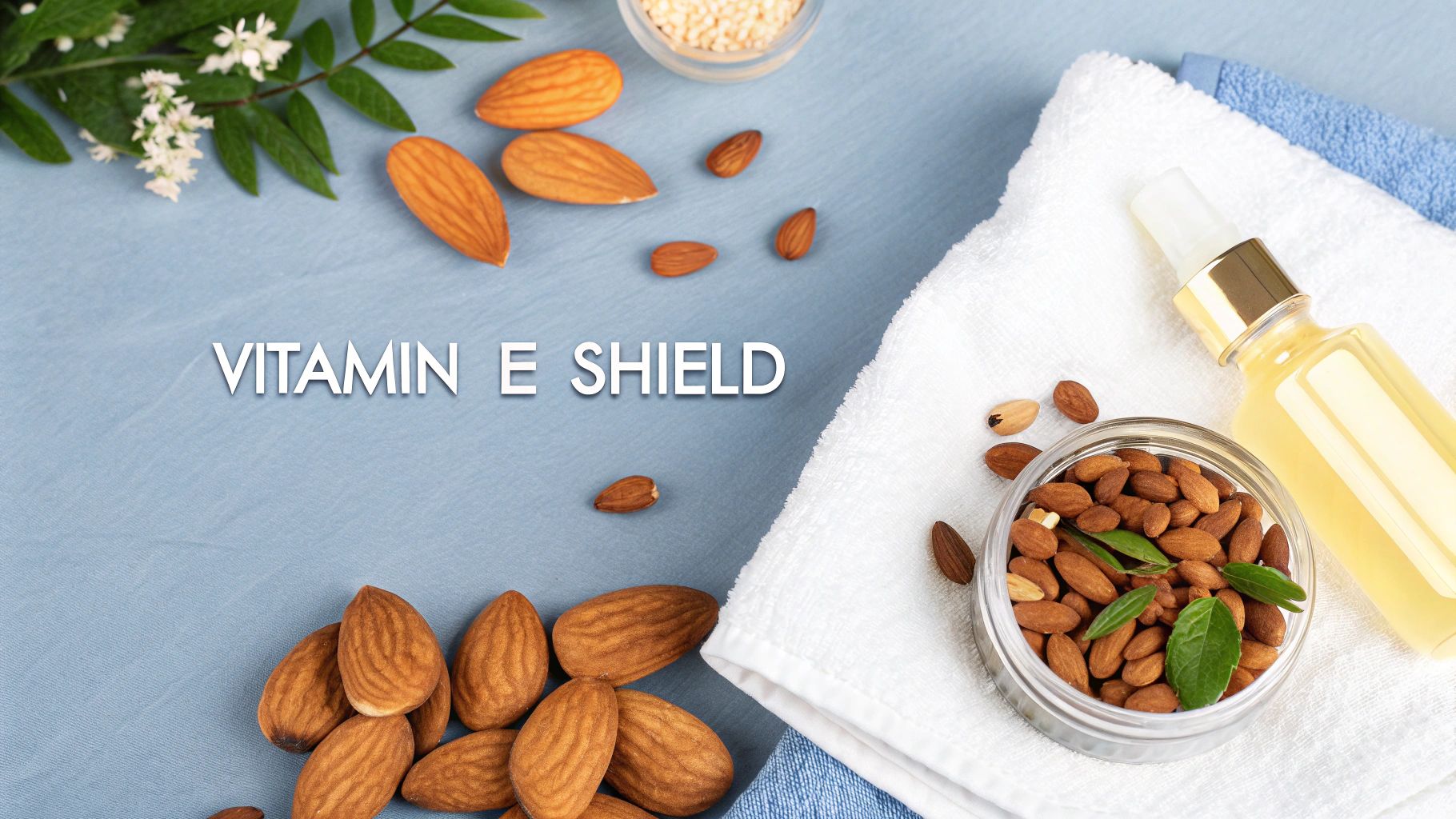
The Ultimate UV Defense Partnership
Vitamin E is a potent antioxidant on its own, but its true power is unlocked when it teams up with Vitamin C. Together, they form a dynamic duo that offers superior protection against the sun’s damaging ultraviolet (UV) rays. This synergy is a cornerstone of cellular skin defense.
Here’s how this powerful partnership works:
- First Line of Defense: Vitamin E, living in the cell membrane, takes the initial hit from UV-induced free radicals, neutralizing them on the spot.
- Regeneration and Support: In the process, Vitamin E gets used up and becomes less effective. This is where Vitamin C steps in to "recharge" it, restoring its antioxidant capacity so it can get back to protecting your skin.
This cyclical relationship means your skin’s defense system is constantly being renewed, offering a much more robust shield than either vitamin could ever provide alone.
This teamwork is a perfect example of nutrient synergy. Vitamin C and E together don't just add to each other's effects—they multiply them, creating a formidable barrier against photoaging and sun damage.
This cooperative action makes them essential for anyone looking to maintain a youthful complexion and protect their skin from long-term environmental stress.
A Natural Anti-Inflammatory Agent
Beyond its protective duties, Vitamin E is famous for its powerful anti-inflammatory properties. It helps calm and soothe irritated skin, making it an indispensable nutrient for recovery and repair. Whether you're dealing with redness from sun exposure, sensitivity, or chronic conditions, Vitamin E can help restore peace.
It works by inhibiting pro-inflammatory enzymes, effectively dialing down the skin's inflammatory response. This makes it particularly beneficial for:
- Calming Sunburns: It helps reduce the redness, swelling, and discomfort that come with too much sun.
- Soothing Sensitive Skin: It can help alleviate irritation and strengthen the barrier of easily reactive skin types.
- Supporting Wound Healing: Its anti-inflammatory action gives the skin's natural repair processes a helping hand.
Incorporating this vitamin is key for maintaining a calm, even-toned complexion. Research confirms that Vitamin E is a crucial fat-soluble antioxidant that shields the skin from damage caused by UV radiation. While taking it orally alone may not offer complete photoprotection, combining it with Vitamin C significantly boosts its effects. You can find more details in these skin health findings on Vitamin E.
Choosing the Right Sources of Vitamin E
To really get the benefits of Vitamin E, it's best to get it from both your diet and, if needed, your skincare. Different forms of the vitamin exist, and knowing which ones to look for can make a huge difference.
For your diet, focus on incorporating foods rich in this nutrient:
- Nuts and Seeds: Almonds, sunflower seeds, and hazelnuts are fantastic sources.
- Leafy Greens: Spinach and Swiss chard contain valuable amounts.
- Healthy Fats: Avocados and olive oil also contribute to your daily intake.
When it comes to skincare products, keep an eye out for tocopherol or tocotrienols on the ingredient list. These are natural and highly effective forms of Vitamin E that can deliver its soothing and hydrating benefits directly to the skin, helping you achieve a resilient and healthy glow.
Vitamin A: The Gold Standard for Anti-Aging
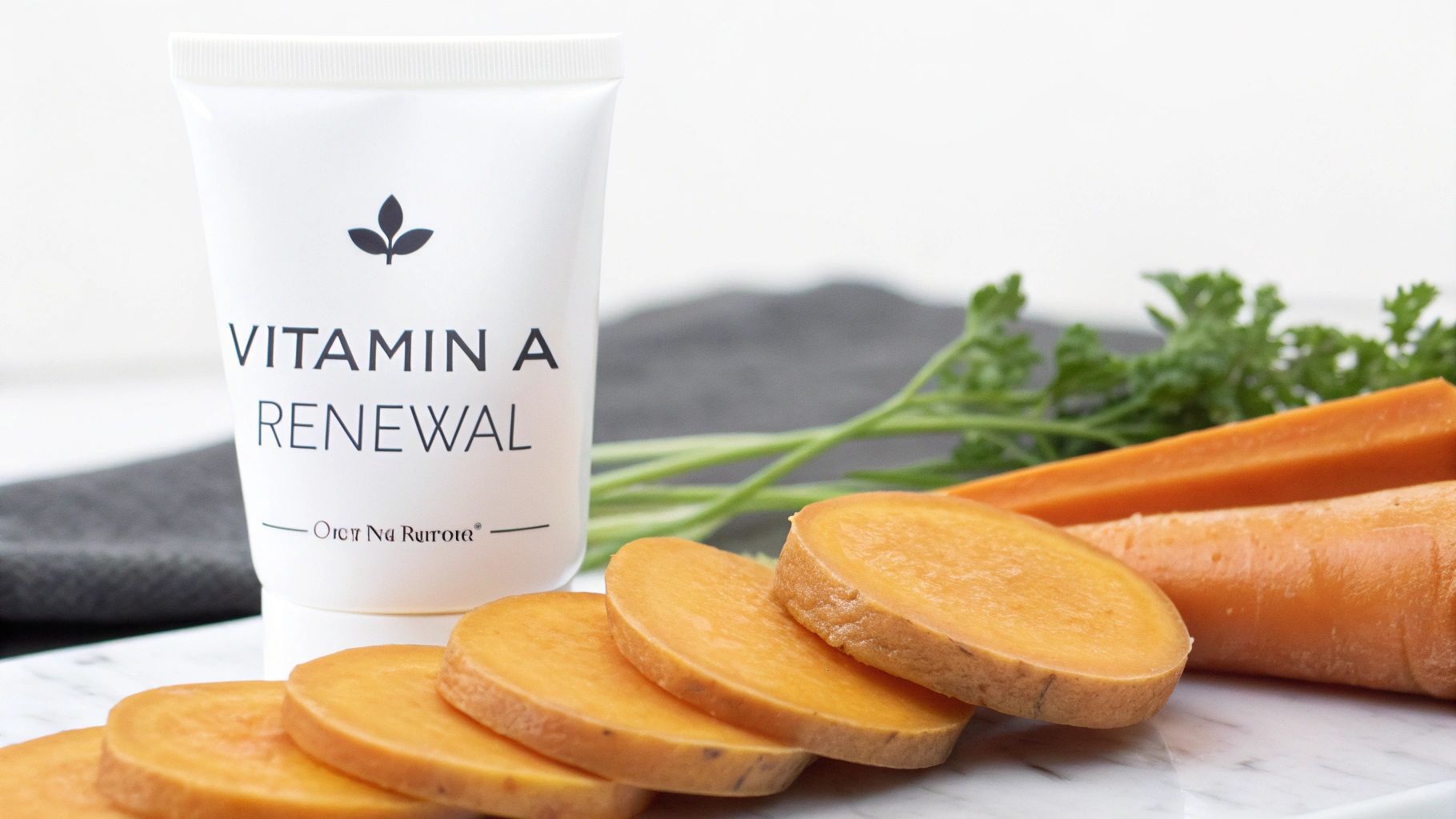
When it comes to reversing the signs of aging, Vitamin A and its powerful derivatives, known as retinoids, are in a class of their own. For decades, they've been hailed as the gold standard in dermatology, and for good reason. This isn't just another ingredient that sits on the skin's surface; it's a powerhouse nutrient that works at the cellular level to fundamentally change how your skin behaves.
Think of Vitamin A as a bootcamp instructor for lazy skin cells. As we get older, our cell turnover—the natural process of shedding dead skin to make way for new, fresh cells—starts to slow down. This sluggish pace is what leads to that dull, rough, and uneven look. Vitamin A gets in there and whips those cells back into shape, speeding up the entire process.
This accelerated turnover is a game-changer. Not only does it reveal a brighter, smoother complexion, but it also helps keep pores from getting clogged, which is a major win for anyone prone to breakouts. It's like hitting the reset button, encouraging your skin to act younger from its deepest layers upward.
Restructuring Your Skin From Within
But the real magic of Vitamin A happens far beneath the surface. It dives deep into the dermis—your skin's foundational layer—to kickstart collagen production. Collagen is the protein that gives skin its firm, youthful scaffolding, but our natural supply dwindles with age, paving the way for fine lines and wrinkles.
Vitamin A sends a direct signal to the specialized cells called fibroblasts, essentially telling them to get back to work making new, healthy collagen.
By firing up the collagen factory, Vitamin A helps to:
- Firm and Thicken the Skin: It reinforces the skin's underlying structure, making it more resilient and less prone to sagging.
- Smooth Fine Lines: More collagen means more natural "plumpness" from within, effectively filling in wrinkles from below.
- Improve Elasticity: It helps restore that youthful bounce and snap-back that we lose over time.
This is why retinoids are one of the most effective tools we have against wrinkles. They tackle the problem at its source by rebuilding the skin's support system.
Think of it this way: While many ingredients offer temporary surface-level hydration, Vitamin A is like an architect rebuilding your skin's foundation. It fundamentally restructures the dermis for long-term, visible improvements in texture and firmness.
This foundational repair is exactly why dermatologists so consistently recommend Vitamin A derivatives for anyone serious about anti-aging.
How to Incorporate Vitamin A Safely
Because Vitamin A is so powerful, it needs to be introduced into your routine thoughtfully, whether through what you eat or what you put on your skin. Your body gets Vitamin A in two main forms:
- Preformed Vitamin A (Retinoids): Found in animal-based foods like eggs, dairy, and liver.
- Provitamin A Carotenoids (like Beta-Carotene): Found in vibrant fruits and vegetables like carrots, sweet potatoes, spinach, and kale. Your body cleverly converts these into Vitamin A as needed.
In skincare, retinoids come in a wide range of strengths. You can find gentler, over-the-counter forms like retinol in many serums and creams, while more potent versions like tretinoin require a prescription.
Because these ingredients are so active, the key is to start slow. Begin by using a new retinoid product just a few times a week to let your skin acclimate and avoid irritation. And remember two non-negotiables: always follow up with a good moisturizer and be diligent about daily sunscreen, as retinoids can make your skin more sensitive to the sun.
The Unsung Heroes: B-Complex And Vitamin D
While Vitamins A, C, and E tend to steal the spotlight, a truly healthy complexion depends on a full support crew. Think of the B-Complex vitamins and Vitamin D as the essential, behind-the-scenes heroes—the maintenance team and cellular communicators that keep your skin’s systems running without a hitch.
The B-vitamin family isn't just one nutrient. It’s a team of eight different vitamins, each with a highly specialized job. Together, they are the engine room for crucial functions like cell metabolism, energy production, and building fresh, healthy skin cells. They are the skilled technicians keeping every part of your skin’s machinery tuned up and running smoothly.
When this team is fully staffed, your skin can repair damage efficiently, generate energy, and hold its structure. But if you're missing these key players, you open the door to all sorts of problems, from nagging dryness and irritation to full-blown inflammation.
The B-Vitamin Maintenance Crew
Several members of the B-complex family are absolute power players for skin health, each handling a specific task. They work in concert to fortify your skin's protective barrier, hydrate from the inside out, and support the very foundation of your cells.
- Niacinamide (Vitamin B3): This one is a true multitasker. It strengthens the skin's lipid barrier, which is critical for locking in moisture and blocking out irritants. It's also well-known for its anti-inflammatory properties, making it a go-to for calming redness and managing conditions like acne and rosacea.
- Pantothenic Acid (Vitamin B5): Often a star ingredient in skincare for its humectant abilities, B5 is a master of hydration. It helps the skin attract and hold onto water, giving you that softer, plumper, more supple look and feel.
- Biotin (Vitamin B7): While famous for its connection to strong hair and nails, Biotin also plays a foundational role in skin. It helps produce the fatty acids that nourish the skin, keeping your complexion clear and healthy.
- Cobalamin (Vitamin B12): This vitamin is vital for cell reproduction and can help dial down inflammation, dryness, and even acne. It's especially important for your skin's overall tone and vitality, and knowing the signs of a deficiency is key. You can learn more by reading about common vitamin B12 deficiency symptoms.
Think of the B-complex as your skin's internal repair service. Niacinamide reinforces the walls (your barrier), Pantothenic Acid manages the plumbing (hydration), and Biotin helps lay a solid foundation. Take one away, and the whole structure becomes vulnerable.
The B-vitamins are a powerful team, and understanding their individual roles helps you see how they contribute to overall skin resilience.
Here’s a quick breakdown of the most impactful B-vitamins for your skin, what they do, and where you can find them in your diet.
Key B-Vitamins for Skin and Their Functions
| B-Vitamin | Also Known As | Primary Skin Benefit | Common Food Sources |
|---|---|---|---|
| B3 | Niacinamide | Strengthens skin barrier, reduces inflammation, and minimizes redness. | Tuna, chicken breast, mushrooms, avocados, green peas. |
| B5 | Pantothenic Acid | Deeply hydrates by attracting and retaining moisture in the skin. | Shiitake mushrooms, sunflower seeds, salmon, avocados. |
| B7 | Biotin | Supports the production of fatty acids essential for clear, healthy skin. | Eggs, almonds, salmon, sweet potatoes, pork. |
| B12 | Cobalamin | Crucial for cell reproduction, helps reduce inflammation and dryness. | Clams, beef, tuna, fortified nutritional yeast, salmon. |
As you can see, a balanced diet rich in these sources is the first step toward giving your skin the B-vitamin support it needs to thrive.
Vitamin D: The Cellular Communicator
Widely known as the "sunshine vitamin," Vitamin D operates less like a building block and more like a smart thermostat for your skin cells. Its main job is to regulate the skin's immune system while managing cell growth and repair. This is absolutely critical for defending against environmental threats and keeping inflammatory flare-ups in check.
It helps keep your skin's innate immune response—your first line of defense against harmful microbes—from going into overdrive. By skillfully modulating this system, Vitamin D prevents it from overreacting, which is often the trigger for inflammatory conditions. It's a key player in maintaining a calm, balanced skin environment.
Even more, Vitamin D has a crucial role in photoprotection, helping your skin defend itself against the damaging effects of UV radiation. It bolsters the skin's natural repair mechanisms, working to mitigate damage before it can lead to premature aging.
Recent clinical studies have really driven home Vitamin D's importance, highlighting its immunomodulatory, antioxidative, and photoprotective properties. In one trial, supplementation led to a 2–4-fold increase in the expression of p53, a vital gene that protects skin cells from UV-induced damage. This perfectly showcases its power to beef up your skin's natural defenses.
This unique combination of immune regulation and cellular protection makes Vitamin D one of the best vitamins for skin health and resilience. It makes sure your skin can not only defend itself but also repair and regenerate effectively, contributing to a truly healthy complexion from the inside out.
Building Your Personal Skin Health Vitamin Plan
Now that you understand how each vitamin works, it's time to build a smart, personalized strategy. True skin health isn’t about chasing a magic pill; it’s about creating a holistic plan where a powerful diet is your non-negotiable foundation.
Think of your daily meals as the primary delivery system for the best vitamins for your skin. Before you even think about supplements, your first goal should be to fill your plate with vibrant, nutrient-dense foods that deliver these essential compounds directly.
This "food-first" philosophy ensures you're getting the full spectrum of nutrients that work together in harmony, not just isolated vitamins. It's how you build a resilient base for long-term skin vitality.
Start with a Nutrient-Rich Foundation
Building a diet for glowing skin doesn't have to be complicated. The real key is variety and color. Aim to bring in a mix of foods rich in vitamins A, C, E, D, and the B-complex to cover all your bases.
Here’s a practical checklist to get you started:
- Vibrant Vegetables: Load up on sweet potatoes and carrots for beta-carotene (Vitamin A), and add bell peppers and broccoli for a potent dose of Vitamin C.
- Leafy Greens: Spinach and kale are true nutritional powerhouses, offering a solid hit of vitamins A, C, and E.
- Healthy Fats: Avocados, almonds, and sunflower seeds are excellent sources of Vitamin E, which is crucial for moisturizing your skin from the inside out.
- Quality Proteins: Fatty fish like salmon provides Vitamin D, while eggs and lean meats are packed with essential B vitamins.
By focusing on a diverse, whole-foods diet, you provide your body with the fundamental building blocks needed for cellular repair, collagen synthesis, and antioxidant defense. This is the most sustainable path to a genuinely healthy complexion.
When to Consider Supplementation
Even with a perfect diet, sometimes there are gaps. Modern lifestyles, dietary restrictions, or individual health factors can make it tough to get optimal levels of every nutrient from food alone. This is where strategic supplementation can play a valuable supporting role.
Supplements should act as a bridge, not a replacement. They shine when used to target specific deficiencies or to provide a therapeutic dose of a vitamin that’s hard to get in high amounts from food—like Vitamin D for those of us with limited sun exposure.
Before starting any new supplement, however, it’s essential to know where you stand. Guessing your nutrient levels can be ineffective and potentially unsafe. To make a smart decision, it's wise to understand the process of testing for vitamin deficiency to get a clear picture of your body's specific needs.
Ultimately, creating your plan requires one last crucial step: always talk to a healthcare professional or a registered dietitian. They can analyze your diet, health status, and goals to provide personalized recommendations, ensuring your approach is both safe and effective for achieving lasting skin health.
Got Questions? Let's Talk Skin Vitamins.
When you start digging into vitamins for skin health, it’s natural for questions to pop up. Let's clear up some of the most common ones so you can build your plan with confidence.
Can I Just Get Everything I Need From My Diet?
A balanced diet loaded with colorful fruits, vegetables, and healthy fats is your absolute best starting point. Think of a vibrant plate as your first line of defense against any nutritional gaps—it can provide most of what your skin needs to thrive.
But let's be realistic. Modern life, specific dietary choices, or even where you live can create shortfalls. For instance, if you're not getting much sun, keeping your Vitamin D levels up can be a real struggle. The best way to look at it is this: your diet is the foundation, and targeted supplements are the reinforcements you bring in to patch up any specific cracks.
Your diet is the foundation, and supplementation is the reinforcement. One builds on the other, but neither can fully replace its counterpart for achieving the best results.
Before adding any supplements, it’s always a good idea to chat with a healthcare provider to figure out what your body actually needs.
How Long Until I Actually See a Difference in My Skin?
Patience is the name of the game here. Your skin cells are on a cycle that takes about 28 days to complete a full turnover, and that timeline gets even longer as we get older. You can't rush biology.
You’ll likely need to stick with your vitamin routine consistently for at least 2-3 months before you start noticing real, measurable changes in your skin's texture, glow, or clarity. The benefits are cumulative, meaning that long-term consistency beats short-term, high-dose approaches every time. Of course, your results will depend on your starting point and overall lifestyle.
Are Topical Serums or Oral Vitamins Better for My Skin?
This isn’t an either/or situation. They work best as a team, tackling skin health from two completely different angles.
- Oral Vitamins (The Inside Job): When you ingest vitamins, you're nourishing your skin from the inside out. This provides the fundamental building blocks for healthy cells all over your body, supporting crucial functions like collagen production and cellular repair.
- Topical Vitamins (The Direct Approach): Applying something like a Vitamin C serum delivers a potent, concentrated dose directly to a specific area. This is perfect for targeting surface-level issues like sunspots, environmental damage, or fine lines with pinpoint accuracy.
For the most comprehensive results, use both. A nutrient-rich diet and smart supplements support your skin's underlying health, while targeted topicals go to work on specific cosmetic concerns.
At Elite Bioscience, we provide injectable vitamin therapies designed to support your skin's health from within, ensuring your body has the essential nutrients it needs for a vibrant, resilient complexion. Explore our advanced solutions at https://elitebioscience.co.




